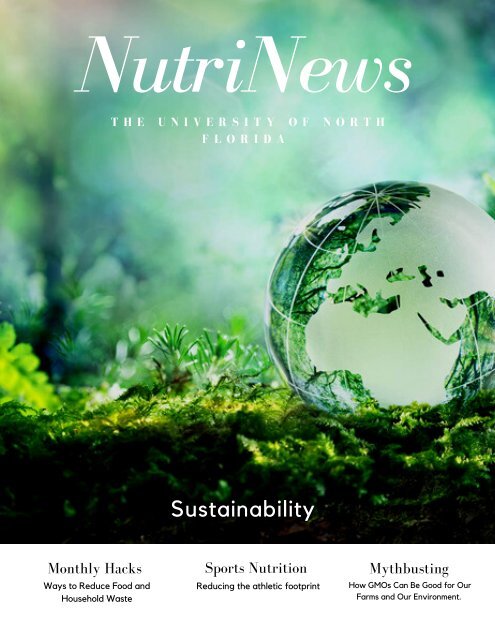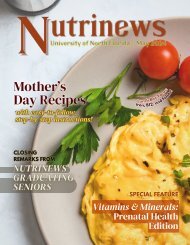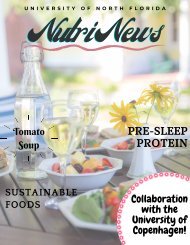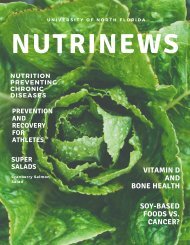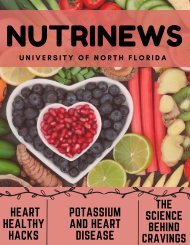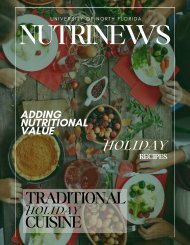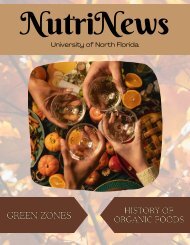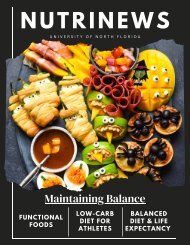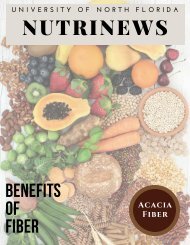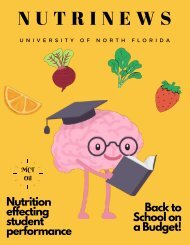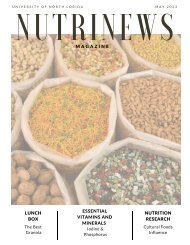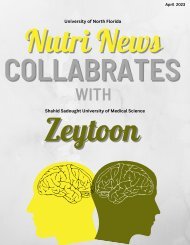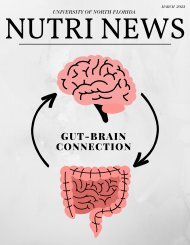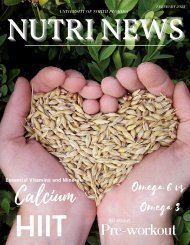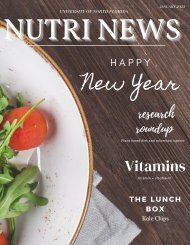April Issue of NutriNews
Hello all! The theme for April is Sustainability. Topics include Nutrition research and tips to reduce food and household waste. This month’s student spotlight is on our very own Mark Stemmerman. I hope you all enjoy, learn, and get inspired by this month’s articles and recipes!
Hello all!
The theme for April is Sustainability. Topics include Nutrition research and tips to reduce food and household waste. This month’s student spotlight is on our very own Mark Stemmerman.
I hope you all enjoy, learn, and get inspired by this month’s articles and recipes!
- No tags were found...
Create successful ePaper yourself
Turn your PDF publications into a flip-book with our unique Google optimized e-Paper software.
<strong>NutriNews</strong><br />
T H E U N I V E R S I T Y O F N O R T H<br />
F L O R I D A<br />
Sustainability<br />
Monthly Hacks<br />
Ways to Reduce Food and<br />
Household Waste<br />
Sports Nutrition<br />
Reducing the athletic footprint<br />
Mythbusting<br />
How GMOs Can Be Good for Our<br />
Farms and Our Environment.
Table <strong>of</strong> Contents<br />
2<br />
COVID CORNER<br />
Does Covid have an impact<br />
on the environment?<br />
8<br />
SPORTS NUTRITION<br />
Reducing Athletes footprint<br />
15<br />
MONTHLY<br />
HACKS<br />
Ways To Reduce Food and<br />
Household Waste<br />
28<br />
FACULTY<br />
SPOTLIGHT<br />
An interview with Pr<strong>of</strong>essor<br />
Meghan Niemczyk<br />
4<br />
MYTHBUSTING<br />
GMOs Can Be Good for Our<br />
Farms and Our Environment<br />
10<br />
STUDENT SPOTLIGHT<br />
Mark Stemmerman<br />
20<br />
INTERNATIONAL<br />
COLLABORATION<br />
An Interview with Dr. Yolanda<br />
Fabiola Márquez Sandoval<br />
33<br />
NEW IN THE NEWS<br />
RESEARCH ARTICLE<br />
Seaweed in diets <strong>of</strong> cows shows<br />
promise in reducing methane<br />
emissions<br />
5<br />
FOOD SCIENCE<br />
Crop Colonization :<br />
Transgenic Plants<br />
14<br />
THE LUNCH BOX<br />
Homemade Vanilla Oat Milk<br />
24<br />
NUTRITION<br />
RESEARCH<br />
How Human Health is Linked to the<br />
Health <strong>of</strong> the Environment, Plants,<br />
and Animals<br />
36<br />
NUTRINEWS<br />
STAFF<br />
Meet our staff!
5<br />
Crop Colonization: Transgenic Plants<br />
By: Samantha Dill<br />
Though humans have pursued the modification <strong>of</strong> natural environments for over 200,000 years, agriculture<br />
was only invented 10,000 years ago!1 Back then, agriculture meant planting desired seeds, harvesting the<br />
fruit, and “retaining seeds from favored specimens for subsequent planting.”1 Nowadays, the modern<br />
equivalent <strong>of</strong> this artificial selection is possible through genetic modification by way <strong>of</strong> DNA manipulation,<br />
where recombinant technology improves crop output.<br />
In the context <strong>of</strong> this article, genetically modified organisms (GMOs) are plants whose genes have been<br />
deliberately altered by the human species.1 The primary goal <strong>of</strong> this modification is to increase crop output.<br />
Modern-day genetic modification was revolutionized in the early 1970s by a Belgian research team, where<br />
geneticists, led by Lucien Ledoux, isolated pieces <strong>of</strong> DNA, spliced together molecules, and reinserted the<br />
recombinant genes (referred to as the transgene) into living organisms (referred to as the transgenic [GM]<br />
organism).1 Ledoux’s team restored a type <strong>of</strong> barley’s vitamin D-producing capacity by “transferring a<br />
bacterial gene into a mutant strain <strong>of</strong> Arabidopsis.”<br />
An example <strong>of</strong> a GM crop is the papaya fruit. In 1950s Hawaii, the papaya ringspot virus (PRSV) nearly<br />
decimated Oahu’s papaya production; this caused the industry to move to the Puna district on the Big Island<br />
through the early 1990s. After the PRSV made its way there in 1992, Cornell scientists stepped in to identify,<br />
isolate, and clone a PRSV to insert into papaya tree cells. In this procedure, the viral gene kept producing a<br />
coat protein to stimulate the GM trees to develop a genetic resistance to the virus.1 The foreign protein served<br />
as a vaccine against PRSV. The papaya was one <strong>of</strong> the first commercially approved American GM crops that<br />
were planted in the early 1990s. By 1999, over 40% <strong>of</strong> corn, 45% <strong>of</strong> soybean, and 50% <strong>of</strong> cotton crops planted<br />
in the US underwent genetic modification.<br />
As <strong>of</strong> now, GM plants cover over 130 million acres and are on the ingredients lists <strong>of</strong> more than 70% <strong>of</strong><br />
products in North American grocery stores.1<br />
Although genetic modification may be controversial to some, nature itself served as an inspiration for genetic<br />
engineers. The intended purpose <strong>of</strong> transgenic organisms is not to create mutant zombie clone fruits and<br />
vegetables, but to strengthen crops. Now that there is the technological capacity to modify genes to meet<br />
physical and cultural needs, there are unparalleled opportunities to improve food production.<br />
References<br />
1. Avise JC. The Hope, Hype, & Reality <strong>of</strong> Genetic Engineering : Remarkable Stories from<br />
Agriculture, Industry, Medicine, and the Environment. Oxford University Press; 2004.
7
the Athletic Footprint<br />
Reducing<br />
<br />
8<br />
By: Brianna Brand<br />
How do athletes play a role in sustainability? Naturally, those who participate in<br />
prolonged physical activity have higher nutrient needs than the average person.<br />
Due to those increased nutrient needs, consumption <strong>of</strong> resources is higher among<br />
this group. In addition to increased caloric needs, athletes require more protein to<br />
sustain and build muscle. Diet relates to sustainability because food production is<br />
one <strong>of</strong> the most significant contributors to pollution, primarily animal-based<br />
products, <strong>of</strong>ten the main dish.1<br />
The world population is growing, and the amount <strong>of</strong> arable land is decreasing;<br />
something has to change.1 Currently, 1/3 <strong>of</strong> arable land is being used for<br />
agriculture. As a result, food production is supported by ¾ <strong>of</strong> global water, and 1/5<br />
<strong>of</strong> energy resources is used to support it.1 This process is responsible for 30% <strong>of</strong><br />
greenhouse gases being emitted and is predicted to rise as much as 60% by the year<br />
2030.1 The largest contributor <strong>of</strong> this is livestock farming, which takes up half <strong>of</strong> all<br />
land used for agriculture.<br />
Decreasing our carbon footprint can be done by increasing the consumption <strong>of</strong><br />
plant proteins, such as legumes, nuts, and whole grains. Consequently, reducing<br />
foods that release the most greenhouse gases includes beef, cheese, and pork.1<br />
There is data that supports shifting to a more plant-based diet correlates with<br />
better health outcomes and longevity. In terms <strong>of</strong> sports performance, opting for<br />
more plant-based foods will not hinder performance as long as the athlete is<br />
meeting their macro and micronutrient needs. For the environment, eating less<br />
meat and dairy can reduce land usage tremendously and allow for the crops that<br />
would be used for livestock agriculture to feed more people and decrease the rate<br />
<strong>of</strong> deforestation.
While shifting our food choices, we should<br />
also be mindful <strong>of</strong> our waste. Reduce-<br />
Reuse-Recycle is likely a phrase many <strong>of</strong> us<br />
haven't heard in quite a while but is still<br />
equally as important as it was then.<br />
Reducing comes first in this mantra<br />
because reducing our product<br />
consumption and waste is one <strong>of</strong> the best<br />
ways to limit what ends up in landfills.<br />
For example, athletes can reduce their waste by investing in reusable water bottles<br />
and opting for powder and tablet forms <strong>of</strong> electrolytes rather than buying singleuse<br />
plastic bottles.2 As for athletic gear, lightly worn clothing and shoes would be<br />
welcomed by any local charities. For example, worn-down shoes can be sent to<br />
Soles4Souls and Nike's Reuse a shoe program to be recycled into playgrounds and<br />
more.<br />
There are many ways athletes can be environmentally conscious while<br />
simultaneously reaching their performance goals. These adjustments can provide<br />
better health outcomes for the individual and reduce unnecessary waste.<br />
References<br />
1. Meyer N, Reguant-Closa A. Eat as if you could save the planet and win! Sustainability Integration into<br />
Nutrition for Exercise and Sport. Nutrients. 2017;9(4):412. doi:10.3390/nu9040412 2. Satyfit205. 7 ways to be a more<br />
sustainable athlete. Stayfit305. Published August 13, 2020. Accessed March 5, 2022.<br />
https://www.stayfit305.com/news/seven-ways-to-be-a-moresustainable-athlete<br />
9
STUDENT SPOTLIGHT:<br />
MARK STEMMERMAN<br />
<br />
B Y : C A R O L E G A N<br />
<br />
Almost to the finish line! Hopefully, all <strong>of</strong> the wonderful<br />
students and staff here at UNF are making it through<br />
the semester with ease. This month, we interviewed<br />
Mark Stemmerman as our Student in the Spotlight. This<br />
ambitious man is from Middletown, New Jersey, and is<br />
currently a full-time store manager at a locally owned<br />
GNC franchise located <strong>of</strong>f Beach Boulevard, an<br />
investor, and a business owner. Mark enjoys cooking,<br />
reading, the outdoors, and most things related to<br />
business and critical thinking. He will be graduating<br />
alongside his peers this spring and has plans to move<br />
on to a graduate program in functional medicine this<br />
fall. He aims to achieve financial independence away<br />
from the typical nine-to-five job, as personal freedom<br />
is his goal and making a difference is his mission. To<br />
learn more about Mark and his experience in the<br />
dietetics program thus far, continue reading!<br />
CE: What inspired you to pursue a degree in Nutrition and Dietetics?<br />
MS: My inspiration to pursue a degree in Nutrition and Dietetics started during my weight loss journey as a<br />
teenager in high school. After experiencing the change it made to my physical health and my emotional<br />
health, worldview, and social interactions, I had to recreate this feeling <strong>of</strong> accomplishment and pride with<br />
others who were struggling with the same issues that stemmed from being overweight. I began empowering<br />
others through nutrition and other healthy lifestyle habits.<br />
10
CE: What do you enjoy doing with your time<br />
outside <strong>of</strong> the classroom?<br />
MS: What you do with your free time makes a<br />
world <strong>of</strong> difference in where you are going. My<br />
time outside the classroom (and work) gets spent<br />
on my ambitions and passions. I make it necessary<br />
to continue learning outside <strong>of</strong> my field <strong>of</strong> study to<br />
develop my character further. I do this by reading<br />
frequently and creating personal projects to<br />
investigate my interests.<br />
A large portion <strong>of</strong> my time is spent on my<br />
entrepreneurial endeavors and living a healthy<br />
lifestyle; this includes working out, meditating,<br />
cleaning and organizing my internal and external<br />
environment, and cooking, which is a huge passion<br />
<strong>of</strong> mine.<br />
CE: What has been most challenging to you<br />
during your time in the Undergraduate<br />
Program?<br />
MS: Challenges are no stranger to anyone<br />
pursuing an undergraduate degree. Many can<br />
relate that these last four or five years have been<br />
the first time we have been on our own. With that<br />
said, you need to take care <strong>of</strong> yourself; therefore,<br />
growth is inevitable. I am learning how to prioritize<br />
the now multitude <strong>of</strong> tasks and responsibilities<br />
thrown at me while staying productive and not just<br />
busy. Yet remaining aligned with what makes you<br />
happy and not doing things for any reason other<br />
than that.<br />
Deciding on the area <strong>of</strong> study to pursue as my<br />
college career progressed was a decision that has<br />
been in contemplation since day one—finding that<br />
one thing you genuinely enjoy and want to spend a<br />
significant portion <strong>of</strong> your life focusing on it.<br />
Finding the answer to that question was the most<br />
challenging conflict I have overcome while an<br />
undergrad.<br />
CE: This month we’re talking a lot about<br />
sustainability. Do you have any ideas or<br />
thoughts that you think can improve food<br />
sustainability in the future?<br />
MS: I find it disappointing that so many people<br />
don't think about food sustainability when so many<br />
can not stop thinking about if they will have the<br />
ability to eat tomorrow or not.<br />
11
or not. Many people go about their lives with<br />
tunnel vision, only seeing what's on the surface <strong>of</strong><br />
society and not how it truly is. Not to mention that<br />
most <strong>of</strong> our "food" is just poison; getting people to<br />
consume more unprocessed food will create less <strong>of</strong><br />
a need for cash crops. For example, corn, which<br />
the United States produced three-hundred-eightyfour<br />
million metric tons last year on roughly ninety<br />
million acres <strong>of</strong> land, isn't even used to feed the<br />
population. Approximately fifty percent goes to<br />
feeding livestock and the rest towards bi<strong>of</strong>uels.<br />
The small amount that reaches our plate is in the<br />
form <strong>of</strong> high-fructose corn syrup. Removing the<br />
need to grow corn for animal feed eliminates the<br />
need for half <strong>of</strong> our corn produced, allowing other<br />
crops to flourish on those forty-five-million acres <strong>of</strong><br />
land we will no longer need for corn growth.<br />
Limiting our reliance on livestock alone will reduce<br />
the need for this insane amount <strong>of</strong> corn. Reduced<br />
demand for livestock leads to reduced livestock<br />
needed for consumption, eliminating feedlots. Side<br />
note, feedlots are cattle farms where the cattle<br />
aren't free to roam and eat grass; therefore, they<br />
are fed corn products. As technology advances,<br />
our knowledge <strong>of</strong> hydroponics, aquaponics, and<br />
vertical farming becomes more prevalent. Food<br />
sustainability isn't the problem; it's greed.<br />
CE: What advice do you have for students who are<br />
interested in attending the Nutrition & Dietetics<br />
Program at UNF?<br />
MS: For students interested in attending the Nutrition<br />
and Dietetics program at UNF or attending university in<br />
general, it is essential to follow your interests.<br />
12
Don't drag yourself down a path you have no<br />
desire to pursue. Focus on yourself and make<br />
decisions based on where your enthusiasm lies.<br />
There is no doubt you can be successful doing<br />
otherwise, but that comes at the cost <strong>of</strong> your<br />
happiness. Don't follow the crowd, be yourself and<br />
embrace whoever that is. If you are unsure <strong>of</strong><br />
where you want to go, make it a point to explore<br />
different interests and always continue learning.<br />
CE: What excites you most about Graduation<br />
this year?<br />
MS: Having a summer break has been a long time<br />
coming for me. Graduation is the time we have all<br />
been waiting for since we started. Any significant<br />
change in life is always exciting, but moving on to<br />
a graduate program has been on my mind since I<br />
decided to go. More so, one that involves a<br />
curriculum that excites me makes the anticipation<br />
substantially more present, along with the time<br />
that I will have to focus on other areas <strong>of</strong> my life<br />
that need improvement, progress, or perfection.<br />
CE: What are your career goals after<br />
completing school?<br />
MS: As I can see myself being a forever student,<br />
attending university for the rest <strong>of</strong> my life, I would<br />
enjoy exploring areas within my field <strong>of</strong> interest<br />
through research and involvement in policy making<br />
on a public health level or in the realm <strong>of</strong><br />
nutritional toxicology. This desire is because <strong>of</strong> my<br />
need to change an industry that is in dire need <strong>of</strong><br />
improvement. Due to the lack <strong>of</strong> freedom most jobs<br />
provide, I don't ideally foresee myself working for<br />
someone else. Until that time comes, there are<br />
many areas I would like to get my foot in the door<br />
in; these include counseling, life coaching, or<br />
anything that allows me to be a direct influence on<br />
someone's internal and external life. I strive to<br />
become an asset to people in need <strong>of</strong> change or<br />
actively working towards a happier, healthier, and<br />
more wholesome life. With the many factors that<br />
push back against our will to do better, I want to<br />
be the opposing force that will alter our reality as<br />
we know it.<br />
CE: Do you have a favorite inspiring quote or<br />
mantra that you live by and would like to share<br />
with others?<br />
MS: “So many <strong>of</strong> us choose our path out <strong>of</strong> fear<br />
disguised as practicality. What we want seems<br />
impossibly out <strong>of</strong> reach and ridiculous to expect, so<br />
we never dare to ask the universe for it.” - Jim<br />
Carrey<br />
Rapid-Fire Qs:<br />
Favorite color? Blue<br />
Favorite movie? Zombieland<br />
Favorite outdoor activity? Nature walks<br />
Favorite book? “The Voice <strong>of</strong> Knowledge” by<br />
Miguel Ruiz<br />
Favorite food? All <strong>of</strong> them<br />
13
Homemade Vanilla Oat Milk<br />
<br />
By: Paige Courtier<br />
Ingredients:<br />
4 cups cold, filtered water<br />
1 cup rolled oats<br />
4 dates<br />
1 tsp Salt<br />
1 tsp Vanilla extract<br />
Recipe:<br />
1. S<strong>of</strong>ten the dates<br />
Boil hot water<br />
Allow to soak in hot water for 3 minutes<br />
2. Pour all ingredients into a blender, blend until smooth<br />
3. Strain in a cheesecloth for a smoother texture (optional)<br />
Reference:<br />
Capri, L. Homemade oat milk-in less than 5 minutes. Good Food Baddie. Published <strong>April</strong> 4, 2020. Accessed February 28, 2022. https://goodfoodbaddie.com/homemade-oat-milk/<br />
<br />
14
16<br />
and ends up getting tossed before it is used.<br />
Really leaning into your personal food<br />
preferences and searching for seasonal<br />
produce can help you consume the foods that<br />
you purchase. Creating meal plans, prepping<br />
food before it enters the refrigerator, and<br />
utilizing your freezer for leftovers before they<br />
go bad can all help reduce food waste. Of<br />
course, food waste is inevitable sometimes, so<br />
be gentle with yourself as you navigate life<br />
and sustainable living in the process. Reducing<br />
the amount <strong>of</strong> single-use items purchased can<br />
reduce the number <strong>of</strong> raw materials used,<br />
reduce greenhouse gas emissions made, help<br />
prevent pollution, save energy, save money<br />
long-term, reduce the amount <strong>of</strong> waste that<br />
needs to be recycled in landfills, and helps<br />
create a more sustainable environment for<br />
future generations.2<br />
Reuse<br />
Reusing food and purchased items can help<br />
reduce the environmental impact <strong>of</strong> living in<br />
the same ways reduction can—through using<br />
less raw materials over time, emitting less<br />
greenhouse gases, saving energy, and so on.2<br />
Reusing items can look different for everyone,<br />
but consider reusing plastic Ziplock bags more<br />
than once in order to extend their time <strong>of</strong> use,<br />
reusing cling wrap during baking or cooking in<br />
a way that is food safe, and reusing<br />
parchment paper<br />
or aluminum foil if you are baking multiple<br />
batches <strong>of</strong> a similar food item. Always consult<br />
the packaging <strong>of</strong> the single-use products to<br />
see the limits <strong>of</strong> reuse the item has. Using<br />
leftovers to repurpose for a new meal is a<br />
great way to cut down on food waste and<br />
save some time preparing your next meal.<br />
Using leftover veggies for a stir-fry the next<br />
day or freezing dishes in glass meal-prep<br />
containers for later use can help reuse food to<br />
eliminate as much waste as possible.<br />
Additionally, if space is available, you could<br />
create compost for food scraps to help bring<br />
nutrients back into your environment.<br />
Recycle<br />
Donating unused shelf-stable products before<br />
letting them expire is a great way to help out<br />
someone who faces food insecurity, while<br />
cutting down on your own waste. If you have<br />
pantry items you would like to donate, UNF’s<br />
Lend-A-Wing program is a free resource for<br />
students to either donate to or utilize for<br />
themselves in the event <strong>of</strong> food insecurity. You<br />
can find more information at<br />
https://www.unf.edu/lendawing/ and their<br />
website also <strong>of</strong>fers additional resources to<br />
help out students in need or who want to lend<br />
a wing. Recycling your plastic, glass, and<br />
cardboard items can help facilitate their reuse<br />
for later products, and keep them out <strong>of</strong> our
landfills. Additionally, purchasing products that are recyclable is another small way to make<br />
an impact. Better yet, using your own reusable items like canvas totes, mesh produce bags,<br />
and reusable household appliances (like reusable c<strong>of</strong>fee filters) can help reduce the amount <strong>of</strong><br />
recycling the world has to process.<br />
When looking to reduce food and household waste, it’s a good idea to strive for progress over<br />
perfection. Practicing one sustainable habit is still a step towards helping out our planet as a<br />
whole. If you are interesting in more ideas on how to reduce, reuse, and recycle, visit<br />
https://www.epa.gov/recycle. Do what you can and try any <strong>of</strong> these simple hacks to help<br />
create a more sustainable future!<br />
References:<br />
1. EPA. Sustainable Management <strong>of</strong> Food Basics.<br />
United States Environmental Protection<br />
Agency. https://www.epa.gov/sustainablemanagement-food/sustainable-managementfood-basics.<br />
Accessed March 4, 2022.<br />
2. EPA. Reduce, Reuse, Recycle. United States<br />
Environmental Protection Agency.<br />
https://www.epa.gov/recycle. Accessed<br />
March 4, 2022.<br />
17
O L U N T E E R S N E E D E D<br />
V<br />
<br />
N I N C R E D I B L E O P P O R T U N I T Y T O G E T<br />
A<br />
N V O L V E D I N A C O M M U N I T Y , L E A R N A N D<br />
I<br />
G R O W<br />
Ogier Gardens<br />
O G I E R G A R D E N S @ U N F . E D U<br />
18
19
International Collaboration Interview<br />
Dr. Yolanda Fabiola Márquez Sandoval Graduate Nutrition Pr<strong>of</strong>essor<br />
Dra. Yolanda Fabiola Márquez Sandoval, Pr<strong>of</strong>esora de la Licenciatura en<br />
Nutrición<br />
By. Atalia Vazquez<br />
Building connections and getting to know people within<br />
our pr<strong>of</strong>ession is exciting and truly enriching. The<br />
knowledge and experience <strong>of</strong> others can not only bring<br />
awareness but inspiration. So, with that in mind I have<br />
the pleasure <strong>of</strong> introducing Dr. Yolanda Fabiola Márquez<br />
Sandoval. She is a graduate pr<strong>of</strong>essor in the Centro<br />
Universitario de Ciencias de Salud (CUCS) at the<br />
University <strong>of</strong> Guadalajara, Mx. She obtained her<br />
undergraduate degree in Nutrition at CUCS in 2004 and<br />
her doctoral degree in Nutrition Science and<br />
Metabolism at the Universitat Rovira I Virgili, España in<br />
2009. Her contributions include 47 scientific articles in<br />
indexed journals, three books, 20 chapters in books, and<br />
six technical reports. Dr. Márquez Sandoval has also<br />
participated in more than 70 conferences.<br />
I had the privilege <strong>of</strong> interviewing her - continue reading<br />
to learn more about Dra. Yolanda Fabiola Márquez<br />
Sandoval.<br />
20
1. Tell us about your academic and career<br />
background in the nutrition and dietetics<br />
field. Why did you choose the dietetic<br />
pr<strong>of</strong>ession?<br />
I chose the nutrition pr<strong>of</strong>ession because <strong>of</strong> the<br />
contact with other human beings, feeling the<br />
warmth <strong>of</strong> supporting someone in their health<br />
challenges. Prior to this career, I took a course<br />
on technology and computing and there I<br />
realized that although I had a great future, I did<br />
not feel totally satisfied with the activities I<br />
carried out in that area. I believe in inspiring<br />
others to reveal the best <strong>of</strong> themselves and<br />
through teaching and research in nutrition I have<br />
found that I connect with these qualities.<br />
1. Cuéntenos sobre su formación académica<br />
y pr<strong>of</strong>esional en el campo de nutrición.<br />
¿Por qué eligió la pr<strong>of</strong>esión de nutrición?<br />
Elegí la pr<strong>of</strong>esión de nutrición por el contacto<br />
con otros seres humanos, sentir la calidez de<br />
apoyar a alguien en sus desafíos con la salud.<br />
Previo a esta carrera realicé una sobre<br />
tecnología y computación y allí me di cuenta que<br />
si bien tenía mucho futuro no me sentía<br />
totalmente satisfecha con las actividades que<br />
realizaba en dicha área. Creo que lo mío es<br />
inspirar a otros a encontrar lo mejor de sí<br />
mismos y a través de la docencia y la<br />
investigación en nutrición he encontrado que<br />
conecto con estas cualidades.<br />
2. What would you do differently in your<br />
career if you could go back in time? Why?<br />
I think I like the trajectory that I have generated<br />
but thinking about that possibility <strong>of</strong> going back<br />
in time, I think that during my undergraduate<br />
studies I would have liked to have put more<br />
emphasis on mastering languages other than<br />
English. I consider it relevant because it breaks<br />
borders more easily, empowers and connects us<br />
with more people and rich literature from<br />
around the world.<br />
2. ¿Qué harías diferente en su carrera si<br />
pudieras retroceder en el tiempo? ¿Por<br />
qué?<br />
Creo que me ha gustado la trayectoria que he<br />
generado, pero pensando en esa posibilidad de<br />
retroceder en el tiempo creo que durante mis<br />
estudios de licenciatura me hubiera gustado<br />
hacer más énfasis en el dominio de otros<br />
idiomas más allá del inglés. Lo considero<br />
relevante pues rompe fronteras con mayor<br />
facilidad, empodera y nos conecta con más<br />
personas y rica literatura de todo el mundo.<br />
21
3. What challenges do you think dietitians<br />
face in your country, and what changes do<br />
you wish to see in the future?<br />
The challenges <strong>of</strong> the pr<strong>of</strong>ession are basically<br />
the lack <strong>of</strong> working conditions to insert all this<br />
critical mass into the workplace. No one doubts<br />
the importance <strong>of</strong> healthy eating in life, and<br />
many recognize the role <strong>of</strong> the nutritionist in<br />
healthcare teams. Even so, there are not enough<br />
places in the health institutions corresponding to<br />
the area <strong>of</strong> nutrition. In the future in terms <strong>of</strong> the<br />
pr<strong>of</strong>ession, I would love to see the employability<br />
<strong>of</strong> nutrition pr<strong>of</strong>essionals with appointments<br />
corresponding to the area in health institutions,<br />
research institutions, companies, foundations,<br />
and in various productive sectors. And as for the<br />
disciplinary area <strong>of</strong> nutrition, I would love to have<br />
more nutritional treatment guides for the<br />
various pathologies and specific populations<br />
instead <strong>of</strong> general guidelines for healthy eating.<br />
3. ¿Qué desafíos cree que enfrentan<br />
nutriólogos en su país y qué cambios desea<br />
ver en el futuro?<br />
Los desafíos de la pr<strong>of</strong>esión son<br />
elementalmente la falta de condiciones laborales<br />
para insertar en el mundo laboral a toda esa<br />
masa crítica. Nadie duda de la importancia de<br />
una alimentación saludable en la vida, y muchos<br />
reconocer el papel del nutriólogo en los equipos<br />
de trabajo de salud. Aún así no hay plazas<br />
suficientes en las instituciones de salud<br />
correspondientes al área de nutrición. En el<br />
futuro en cuanto a la pr<strong>of</strong>esión, me encantaría<br />
ver tanto en instituciones de salud, de<br />
investigación, empresas, fundaciones, y en<br />
diversos sectores productivos la empleabilidad<br />
de pr<strong>of</strong>esionales de la nutrición con<br />
nombramientos correspondientes al área. Y en<br />
cuanto al área disciplinar de nutrición, me<br />
encantaría se tuvieran mayor cantidad de guías<br />
de tratamiento nutricio para las diversas<br />
patologías y poblaciones específica y dejar de<br />
funcionar con guías generales de alimentación<br />
saludable.<br />
4. What characteristics do you consider an<br />
aspiring dietitian needs?<br />
Great passion for serving society, desire for selfimprovement,<br />
love <strong>of</strong> reading and writing,<br />
commitment, responsibility and ethics.<br />
4. ¿Qué características considera que<br />
necesita un aspirante nutriólogo?<br />
Gran pasión por el servicio a la sociedad, ganas<br />
de superación personal, gusto por la lectura y<br />
escritura, compromiso, responsabilidad y ética.<br />
22
5. What are some <strong>of</strong> the nutrition research<br />
you have worked on in the past? Are you<br />
working on anything right now?<br />
My research expertise has focused on diet and<br />
cardiovascular risk. I participated in a large<br />
clinical trial on Prevention with the<br />
Mediterranean Diet with researchers from Spain<br />
and subsequently have been working on the<br />
environmental determinants <strong>of</strong> metabolic<br />
syndrome, emphasizing dietary components and<br />
metabolic markers. These investigations have<br />
strengthened the scientific evidence <strong>of</strong> a healthy<br />
diet on the prevention <strong>of</strong> cardiovascular factors<br />
to limit the development <strong>of</strong> cardiovascular<br />
diseases. And it has allowed us to disseminate to<br />
various social sectors more precise information<br />
on how diet participates in cardiovascular health<br />
in adults.<br />
5. ¿Cuáles son algunas de las<br />
investigaciones sobre nutrición en las que<br />
ha trabajado en el pasado? ¿Está<br />
trabajando en algo ahora mismo?<br />
Mi expertis en la investigación se ha centrado en<br />
alimentación y riesgo cardiovascular. Participé<br />
en un gran ensayo clínico sobre Prevención con<br />
la Dieta Mediterránea con investigadores de<br />
España y posteriormente he estado trabajando<br />
en los determinantes ambietales del síndrome<br />
metabólico, enfatizando en los componentes de<br />
la dieta y marcadores metabólicos. Dichas<br />
investigaciones han fortalecido la evidencia<br />
científica de una alimentación saludable sobre la<br />
prevención de factores cardiovasculares para<br />
limitar el desarrollo de enfermedades<br />
cardiovasculares. Y nos ha permitido divulgar a<br />
diversos sectores sociales información más<br />
precisa de cómo la dieta participa en la salud<br />
cardiovascular en los adultos.<br />
6. Anything you would like to add or share<br />
with our readers?<br />
I would like to thank you for the opportunity to<br />
share this little piece <strong>of</strong> my life with the readers.<br />
Invite them to constantly read reliable sources <strong>of</strong><br />
information to take care <strong>of</strong> themselves, including<br />
aspects <strong>of</strong> their health and nutrition. There are<br />
working groups around the world that are<br />
striving to provide research that supports<br />
actions to improve our relationship with food<br />
and live more peacefully. We are in the era <strong>of</strong><br />
rapid and wide access to data, but not<br />
everything is reliable, and we must know how to<br />
filter and choose sources that provide us with<br />
something positive and constructive so as not to<br />
increase our disappointment with deceptive<br />
news.<br />
6. ¿Algo que le gustaría agregar o compartir<br />
con nuestros lectores?<br />
Me gustaría agradecer la oportunidad de poder<br />
compartir este pequeño fragmento de mi vida<br />
con los lectores. Invitarles a leer constantemente<br />
fuentes fiables de información para cuidar se sí<br />
mismos, incluyendo aspectos de su salud y<br />
nutrición. Existen grupos de trabajo en todo el<br />
mundo que estamos esforzándonos por proveer<br />
investigaciones que respalden acciones para<br />
mejorar nuestra relación con los alimentos y vivir<br />
más en tranquilos. Estamos en la era de un<br />
rápido y amplio acceso a datos pero no todo es<br />
confiable y hay que saber filtrar y elegir fuentes<br />
que realmente nos aporten algo positivo y<br />
constructivo para no incrementar nuestra<br />
angustia con noticias falsas.<br />
23
26
FACULTY<br />
SPOTLIGHT<br />
A N I N T E R V I E W W I T H P R O F E S S O R M E G H A N<br />
N I E M C Z Y K<br />
<br />
<br />
<br />
B Y : A N N A W A T E R M A N<br />
Pr<strong>of</strong>essor Niemczyk or as many <strong>of</strong> us know her Chef Meghan, graduated from the University <strong>of</strong> Florida with a<br />
bachelor’s degree in public relations. She “decided immediately that I was not ready to wear pantyhose and go<br />
to an <strong>of</strong>fice, every day; I wanted to do something else.”<br />
Deciding that culinary school was her next step, she packed her bags and moved to upstate New York without<br />
even being accepted into a culinary program. Once there, she visited the Culinary Institute <strong>of</strong> America in Hyde<br />
Park, New York to tell them that she was interested in attending their program. As fate would have it, they had<br />
an opening and she started within the week.<br />
Upon completion <strong>of</strong> culinary school, Pr<strong>of</strong>essor Niemczyk moved to Jacksonville to work in the restaurant industry<br />
until she had children and decided to take time <strong>of</strong>f to raise them before starting a catering business. Working for<br />
herself did not turn out to be as flexible as she had hoped, so she began searching for something new. This<br />
search brought her to the UNF where she took a job in research with the physical therapy department.<br />
Pr<strong>of</strong>essor Niemczyk worked on the research grant for two years until she transferred to the nursing department<br />
where she worked for over ten years with the nurse anesthetist students while helping transition the program to<br />
a doctorate program.<br />
During this time, Pr<strong>of</strong>essor Niemczyk sought her master’s degree in public health at UNF before making another<br />
move to join Dr. Wright at the Center for Nutrition and Food Insecurity. She is currently the director <strong>of</strong> the<br />
Hunger Network where she collaborates with various hunger organizations throughout Jacksonville in addition to<br />
being the Chef Advisor for Meals on Wings and working part-time with the nursing students. In her spare time,<br />
she works diligently on her doctorate in public health at USF.<br />
Continue reading to learn more about this incredible woman who is making a pr<strong>of</strong>ound impact not only at UNF but<br />
in the Jacksonville community as well and learn not only how UNF is promoting sustainability but how you can as<br />
well!<br />
28
AW: Tell us about your work at Meals on Wings.<br />
Chef Meghan: We have moved beyond recovering food from hospitals alone to receiving<br />
fruits and vegetables from Mr. Greens Produce Distributor. This local company provides<br />
produce for high-end restaurants and country clubs. The produce has to be perfect to<br />
send to the customers. We are able to get so much produce that we have expanded the<br />
cooking abilities in the Hicks Hall kitchen. We simply trim the ends <strong>of</strong> the asparagus and<br />
steam it in the microwave. I <strong>of</strong>ten make herb oil with recovered basil we get. Add that to<br />
the asparagus and you have a delicious side dish for the senior meals.<br />
Now that we have completed some renovations, we can start coordinating with Ogier<br />
Gardens here on campus to grow vegetables for us. We’ve also been out to White Harvest<br />
Farm at the Clara White Mission. A UNF graduate is currently the farm manager there and<br />
wants to grow for us and collaborate with us. They are planning on putting in a kitchen<br />
there for education classes that we hope to collaborate on as well.<br />
“We have so many good people in Jacksonville with so many good intentions. When we<br />
work together, we get there faster and go further.”<br />
AW: What was your major motivating factor for switching from the nursing department<br />
to the nutrition department?<br />
Chef Meghan: I think ultimately, it's such a good fit for me. Before moving to nutrition, I<br />
thought about going to public health because that is what my degree is in. But with all the<br />
nutrition and cooking aspects I really feel like there's a place for me in nutrition. Being able<br />
to teach the quantity food class and lab is also an exciting aspect for me because I used to<br />
teach culinary nutrition at FSCJ.<br />
I’ve also been on the Duval County food policy council, the Florida food policy council, in<br />
addition to helping to facilitate the campus food security task force here at UNF. So, food<br />
and nutrition and food insecurity have been such a focus for me that the nutrition<br />
department is the perfect match for me.<br />
29
AW: Because this is our sustainability issue which is a cause near to your heart. What does<br />
sustainability mean to you and why is it important for us all to consider?<br />
Chef Meghan: The big thing I focus on is food waste. There's enough food in the United States<br />
to feed everyone but we're throwing so much out. We have to look at it across the entire<br />
system, there are upstream ways we can fix things and there are downstream ways we can fix<br />
things.<br />
From our perspective at Meals on Wings, we are working to recover food that would be thrown<br />
out and give it to people who need it, so that's a good use. But then also looking back up the<br />
chain. For example, why does a grocery store have 20 loaves <strong>of</strong> bread out and then send 10 to<br />
the trash? The idea is to look like there is an abundance when in reality you should run out at<br />
the end <strong>of</strong> the day. We started a new route that picks up bread from Panera because there is<br />
always so much bread; at every food pantry, at every mission, there’s just so much bread.<br />
We need policy changes or recommendations for these companies to tone down their volume<br />
to decrease waste.<br />
Another example is rotisserie chickens. After they are out for two hours, they are thrown out.<br />
They won’t let an employee take them home or even sell them for half price. The two-hour<br />
limit is for food safety concerns, however, if they lowered the time to one and a half hours and<br />
then marked them down to half-priced or used the chicken to make something else like<br />
chicken salad, it could really make an impact on food waste.<br />
AW: How are you working to decrease food waste at UNF?<br />
Chef Meghan: For one, at Meals on Wings we decrease food waste by recovering food that<br />
would otherwise be thrown out from local hospitals and repackaging it to be delivered to<br />
seniors in the community. Because we are impacting the senior population who have been<br />
deemed a vulnerable population, using food from hospitals that will be more controlled for<br />
sodium and fat is ideal. However, many times when we recover this food, it is not all used for<br />
this purpose, so I reach out to our other resources like Mission House, Trinity Mission, North<br />
Florida Aids Network, or other missions at the beach to deliver the remaining food or food that<br />
will not be utilized by the senior population. For example, the seniors will likely not be able to<br />
eat chicken wings so if we get those in, I will make a plan for who else we can send them to.<br />
Additionally, sometimes we have extra meals that we will put in the freezer for a different day.<br />
These meals have a three-month expiration date, so about once a month I’ll send them to an<br />
organization in St. Augustine called “Pie in the Sky” that delivers produce to their senior<br />
population so their seniors can also have some meals from us as well or to Northeast Florida<br />
AIDS Network to give to their clients.<br />
We are constantly trying to think, “how can we not waste this item, how can we put it to good<br />
use somewhere?” Finally, with so much produce now, the trimmings and the produce that is a<br />
little too old get packed into my car and to the Ogier Garden for the compost pile.<br />
30
AW: What are some things that our readers can do to promote sustainability and<br />
decrease food waste on a personal level?<br />
Chef Meghan: I think the first and most important thing is to be conscious. Be conscious<br />
<strong>of</strong> what you're buying and what you're using. Because I’m a chef, people may think that<br />
my refrigerator is jam-packed, but it is pretty empty. I get local produce delivered to my<br />
door and it is constantly used.<br />
Second, start decreasing the use <strong>of</strong> plastics. The more you can use reusable stuff, the<br />
better. Use reusable grocery bags at the grocery store, stop using plastic produce bags,<br />
and when you take to lunch, take it in something you're going to wash and keep using<br />
instead <strong>of</strong> something that's going to get thrown out. Being conscientious about all those<br />
little things really adds up.<br />
Third, be creative! So, you've got a bunch <strong>of</strong> vegetables that need to be used up, make a<br />
frittata. You have to be creative and be willing to give it a shot. If all else fails, just Google<br />
it! Put all your ingredients into google and see what pops up.<br />
AW: You mentioned local produce delivery, can you tell our readers what company you<br />
use or other resources in the community that they could utilize as well?<br />
Chef Meghan: I use a company called “Local Fare”. Usually, there is a loaf <strong>of</strong> bread from<br />
the French Pantry and then whatever is in season for fruits and vegetables. Sometimes<br />
we’ll get overwhelmed with certain vegetables like zucchini. So, again that’s when you<br />
get creative! If all else fails, I make a chocolate zucchini loaf that is so good.<br />
There’s another interesting program being run by a farmer in Palatka where she is putting<br />
her fresh produce in vending machines at dollar general and other places where you<br />
don’t generally find produce. It’s like a cooler machine that you can open and get a head<br />
<strong>of</strong> cabbage. So, there are options for local produce, you just have to find them.<br />
31
32<br />
EARTH<br />
DAY<br />
APRIL 22ND, 2022
in diets <strong>of</strong> cows<br />
seaweed<br />
promise in<br />
shows<br />
methane<br />
reducing<br />
emissions<br />
33<br />
B Y : S O F I E V A N M O O R L E G H E M<br />
As is common knowledge, the problem Earth<br />
has been facing is one <strong>of</strong> a great multitude,<br />
several projections, and a laundry list <strong>of</strong><br />
causes. Climate Change is not a new problem,<br />
yet now we are starting to see some <strong>of</strong> the<br />
effects <strong>of</strong> the Earth's warming in our<br />
everyday life. This warming comes from<br />
multiple sources including fossil fuels,<br />
greenhouse gasses, and pollution. However,<br />
the top reason that we are seeing the<br />
speeding up <strong>of</strong> climate warming is because <strong>of</strong><br />
these greenhouse gases, the largest<br />
contributor <strong>of</strong> these gases is methane.<br />
Methane is a very dangerous air contaminant<br />
and a dominant atmospheric gas, stated by<br />
UNEP1 “causes 1 million premature deaths<br />
every year” and “over a 20-year period, it is<br />
80 times more potent at warming than carbon<br />
dioxide.” Methane is also made one <strong>of</strong> two<br />
ways, either through fossil fuels or CO2<br />
combining with Carbon in plants and being<br />
eaten and belched out by cows, not to<br />
mention that it also remains in the atmosphere<br />
for approximately 12 years after it is created.2<br />
This makes methane a large problem in the<br />
scope <strong>of</strong> global climate change, and it is only<br />
going to be a bigger issue moving forward.
34<br />
So yes, methane emissions are obviously scary and seem to do a lot <strong>of</strong> harm but<br />
what does this mean? What is being done about this large issue? Thankfully,<br />
there are a lot <strong>of</strong> scientists thinking about this same dilemma right now and have<br />
been creative in coming up with solutions that can aid the fight against methane<br />
emissions in the long term*. The majority <strong>of</strong> methane emissions stem from<br />
agriculture and the cultivation <strong>of</strong> livestock, roughly 32 percent <strong>of</strong> total<br />
emissions, and are expected to rise to 70 percent by 2050 because <strong>of</strong> growth in<br />
population, economy, and animal agriculture.1 So, science turned their heads<br />
that way for a solution.<br />
Thus, in 2018, scientists from UC Davis and Penn State found results in seaweed.<br />
According to Alexander Hristov3, Pr<strong>of</strong>essor <strong>of</strong> Dairy nutrition, they found that<br />
the seaweed form Asparagopsis taxiformis in “short term studies <strong>of</strong> lactating<br />
dairy cows, there was decreased methane emission by 80 percent and had no<br />
effect on feed intake or milk yield”. Researchers in California4 also found that<br />
the seaweed increased milk production in cows which are why “farmers in<br />
ancient Greece and 18th-century Iceland deliberately grazed their cows on<br />
beaches”. The reason for this is that Asparagopsis’s chemical makeup includes<br />
components that hinder methane production by stopping the binding <strong>of</strong> carbon<br />
and hydrogen together.4 Therefore, this seaweed decreases the amount <strong>of</strong><br />
methane produced from the belches <strong>of</strong> cows.<br />
This breakthrough brings lots <strong>of</strong> excitement to the scientific community,<br />
however, every discovery has its pitfalls and seaweed is no exception. This<br />
finding has raised many questions and concerns, especially in applying it on a<br />
global scale. Yet, this view is still conflicting, according to Penn State’s<br />
Alexander Hristov3 if seaweed is to be used internationally, the manufacturing<br />
scale would have to massively increase, and “with nearly 1.5 billion head <strong>of</strong><br />
cattle in the world, harvesting enough wild seaweed to add to their feed would<br />
be impossible, even to provide it as a supplement to most <strong>of</strong> the United States'<br />
94 million cattle is unrealistic”. Also, Hill5 reports that seaweed farming in the<br />
oceans can be done but could pose more environmental issues. For instance,<br />
they say that the farming <strong>of</strong> seaweed could harm marine mammal diversity and<br />
possibly add to the rise <strong>of</strong> oceanic pollution.5 However, according to UCDavis4,<br />
this is not necessarily the case, and “seaweed cultivation could actually take up<br />
excess nitrogen and dissolved carbon dioxide from ocean waters and cultivating<br />
it could create new economies in impoverished regions.” Nonetheless, new<br />
research needs to be done on the subject <strong>of</strong> seaweed cultivation in order to<br />
fully understand the impact that it will have on the oceans and the atmosphere.
35<br />
The discovery <strong>of</strong> seaweed in the reduction <strong>of</strong><br />
methane in cows is no small feat and it is a<br />
great step forward in the mission to stop<br />
climate change. Discoveries like this are not<br />
only super important to the climate but miles<br />
closer to figuring out ways to live and eat<br />
sustainably. Asparagopsis might aid in the<br />
fight against rising methane emissions from<br />
livestock but that does not mean that it is<br />
over. We all must still take the necessary<br />
steps to continue living sustainably, eliminate<br />
our carbon footprint, and make the world a<br />
better place.<br />
* Climate Change is a big problem, and it<br />
won’t be solved from this alone, but it can<br />
help a small part in it.<br />
1.<br />
2.<br />
3.<br />
4.<br />
5.<br />
References: :<br />
Unep. Methane emissions are driving climate change. Here’s how to reduce them. UNEP.<br />
Published 2021. https://www.unep.org/news-and-stories/story/methane-emissions-aredriving-climate-change-heres-how-reduce-them<br />
Accessed February 28, 2022.<br />
Anonymous. Why methane from cattle warms the climate differently than CO2 from fossil<br />
fuels. CLEAR Center. Published July 7, 2020. https://clear.ucdavis.edu/explainers/whymethane-cattle-warms-climate-differently-co2-fossil-fuels<br />
Accessed February 28, 2022.<br />
Jeff Mulhollem. Seaweed feed additive cuts livestock methane but poses questions.<br />
ScienceDaily. Published 2019. Accessed February 28, 2022.<br />
https://www.sciencedaily.com/releases/2019/06/190617164642.htm<br />
How. How Eating Seaweed Can Help Cows to Belch Less Methane. Yale E360. Published<br />
2018. https://e360.yale.edu/features/how-eating-seaweed-can-help-cows-to-belch-lessmethane<br />
Accessed February 28, 2022.<br />
McFadden J. Hold <strong>of</strong>f — for now — on feeding seaweed to cows to reduce methane |<br />
TheHill. TheHill. Published February 2022. https://thehill.com/opinion/energyenvironment/592243-hold-<strong>of</strong>f-for-now-on-feeding-seaweed-to-cows-to-reduce-methane<br />
Accessed February 28, 2022.
Meet The Staff<br />
Anna Waterman<br />
Editor in Chief<br />
Laura Rogers<br />
Co-Editor in Chief<br />
Anna McQueen<br />
Head Publisher<br />
Follow us!<br />
@unfnutrinews<br />
36
Meet The Staff<br />
Melissa Brennan, M.S.<br />
Head Writer<br />
Maritza Ou<br />
Website Manager<br />
Lindsey Cedeno-Ortiz<br />
Media Manager<br />
Priscilla Stevens<br />
Flyer Creator<br />
Our website:<br />
https://unfnutrinews.wordpress.com/<br />
37
Meet The Staff<br />
Alexandra Threlkeld<br />
Secretary<br />
Atalia Vazquez<br />
Treasurer<br />
Dr. Alireza Jahan-Mihan<br />
Faculty Advisor<br />
Contact Us:<br />
UNF<strong>NutriNews</strong>@gmail.com<br />
38
Meet The Staff:<br />
Larissa DePasqua<br />
Editor<br />
Dalila Mumic<br />
Editor<br />
Janine DAmico<br />
Editor<br />
Follow us!<br />
@unfnutrinews<br />
39
Meet The Staff<br />
Tiffany Hunnicutt<br />
Publisher<br />
Saily Medero<br />
Publisher<br />
Rayonna Hills<br />
Publisher<br />
Our website:<br />
https://unfnutrinews.wordpress.com/<br />
40
<strong>NutriNews</strong> Snack<br />
Sponsers!


